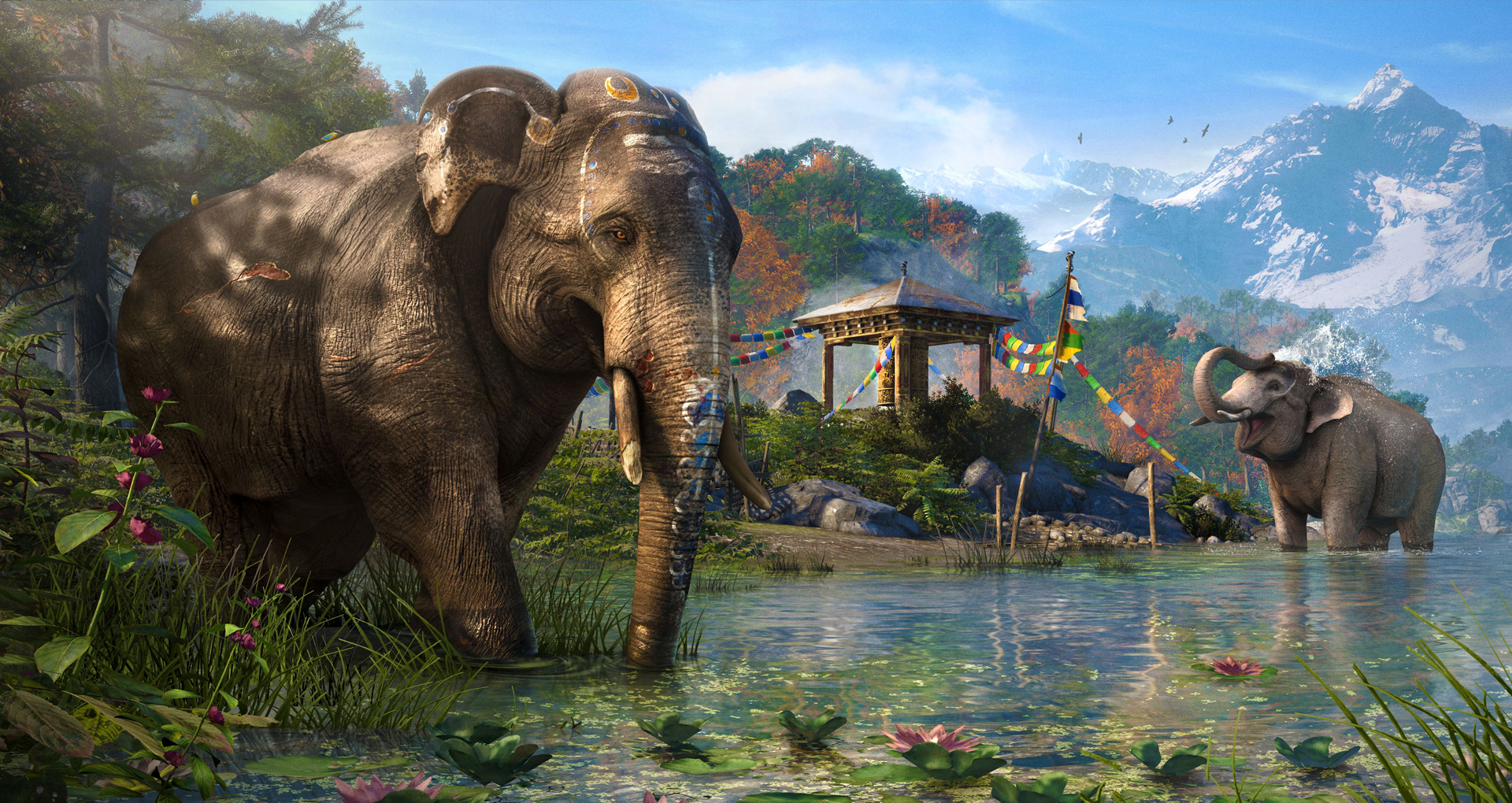GamesRadar+ Verdict
Pros
- +
The world is gigantic
- +
luxuriantly decorated and full of distractions
- +
The firefights mash together AI and terrain features in brilliantly silly ways
- +
Causing mayhem in co-op is predictably hilarious
Cons
- -
Higher peaks aside
- -
it doesn't build on Far Cry 3 in any memorable way
- -
The edgy plot and characters are interesting at first
- -
then tiresome
- -
The middle-of-the-road PvP multiplayer will probably be forgotten
Why you can trust GamesRadar+
You think you’ve never been to Far Cry 4’s Kyrat before, but you have. Many times, in fact. Level the Himalayan backdrop, strip out the regional touches - wandering sherpas who’ll sell you rocket launchers, tumbled statues of the Buddha, those godforsaken Honey Badgers - and you’re left, basically, with Far Cry 3’s Rook Island. Which was, in turn, a tropical reincarnation of Assassin’s Creed: Brotherhood’s expanse of towers and strongholds. Seven years on from the original Assassin’s Creed, Ubisoft Montreal’s battle-proven blueprint for open world games is beginning to show signs of combat fatigue. While an entertaining, hectic shooter, Far Cry 4 feels a bit too much like a sequel for the sake of it.
The game’s greatest strength is once again its explosive volatility, backed up by hefty, lumbering gun handling and movement that encourages players to hang back and radar-tag groups of foes with a phone camera, before deciding how to dispose of them. You won’t always have the luxury, however. A sample scenario: crossing a bridge in my jeep, I run into an enemy courier (you can nobble these guys for Karma, a new flavour of XP that unlocks special perks such as summonable reinforcements and shop discounts). Popping my sawed-off shotgun out the window, I blast the guy clean off his quadbike, then stop the car and get out to loot the corpse, which begins to slide into the river.
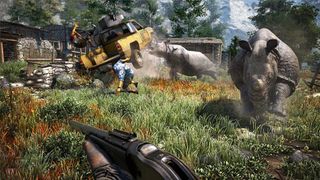
As I'm rushing to intercept it, however, a rhino reduces my car to scrap metal. So I jump into the river. Scrambling up the opposite bank, I discover that the rhino has barged into a shoot-out between the local rebels and Kyrat's Royal Guard. Fortunately, I'm able to commandeer a nearby gyrocopter and carpet-bomb the whole sorry business with Molotov cocktails – which doesn't stop a hidden archer putting an arrow through my ear.
Far Cry 4’s occasional brilliance lies in how it slops together all these variables without completely losing coherence - exploration is once again pegged down by the process of claiming radio towers and bases, gradually tilting Kyrat’s balance of power your way. It’s saying something about how compelling this side of the game can be that even the sporadic glitches, such as AI path-finding problems, feel like valuable additions to the chaos.
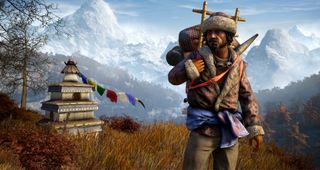
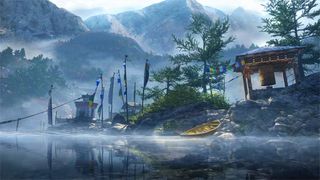
Far Cry 4’s approach to loot can be mystifyingly awful. Besides cash, ammo and weapons, you’ll happen upon miscellaneous rubbish such as sporks, switchblades and condoms. These simply fill up inventory space (bigger loot bags can be crafted from animal skins, as in FC3) till they’re flogged to a merchant. Perhaps this is a cunning critique of how other games stock ‘impoverished’ regions with treasure, lying around waiting for an industrious hero to pocket it. Perhaps it’s just a way of nudging you back to a base after a period of exploration. Either way, having to offload the stuff continually is annoying.
The world’s gleeful messiness also makes it a great fit for co-op, which becomes available a few chapters in. Story missions (many of which take place in areas outside the main world) aren’t available in co-op, but you’ll still get to assassinate base commanders, gather herbs for healing syringes, hunt animals for their pelts, nuke propaganda centres and topple walled fortresses. Co-op partners can’t stray further than 150 meters from each other, but don’t worry - plenty of things can happen inside a 150 meter area. Mortar strikes, for example.
This unpredictability notwithstanding, there’s too often a sense that you’ve been here and done it all before. The game’s niggling perfunctoriness is reflected in its choice of villain. Savagely over-played by Troy Baker, Kyrat's dapper despot Pagan Min is a tribute to Arkham Asylum's Joker - that’s to say, he’s a prancing, aimless cipher. Min does have a backstory of sorts, but it's both easy to second-guess and swiftly forgotten amid the pop culture allusions and sniggering anecdotes that pepper his dialogue (much of which, like that of the Joker, is delivered by radio).
Having gate-crashed your arrival to Kyrat, he merely squats in his fortress at the top of the world map, a bowling pin waiting to be knocked over. The same goes for his four lieutenants, each a spicy but insubstantial study in depravity, who are equivalent to mid-bosses - you’ll face them in creatively themed chapters that experiment just a little beyond the game’s well-honed mixture of stealth and shooting.
Shout out in particular to Yuma, the ex-Triad boss and obligatory Scary Sexy Woman who - during one of the game’s druggy bits - crawls across a ceiling towards you in a fairly pointless nod to Trainspotting. Immediately afterwards, you’re plunged into a workmanlike survival horror level in search of the materials for a grappling hook, then asked to sneak through a prison camp with naught but a handful of C4. It's a refreshing switch-up but, as with the other boss fights, it's more of a change of mood than a real departure from the roaming, killing and looting that occurs in the world itself.
Perhaps Min would be a stronger character if he had a hero as potent as Batman to define himself against. Sadly, protagonist Ajay Ghale is a stunted hybrid of pre-set persona and blank tablet, who spends most of the game being lectured about his destiny. Ghale, you see, is the son of the founders of Kyrat’s Golden Path resistance movement, now headed up by embittered progressive Amita and devout chauvinist Sabal (the political split there intrigues, but isn’t really explored). The campaign asks you to follow the orders of one or the other at points, but the narrative branches thus created merely take you to the same areas in different orders with slightly different combat criteria... and they all end in the same place, a gruelling tussle for Pagan's palace.
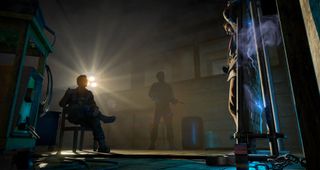
The story does have one redeeming quality - it’s soon forgotten, as you scale and hijack radio masts to expose the locations and side missions immediately around them, and roll over Pagan Min’s bases to unlock fast travel points and trading posts. Base assaults are an excuse to cram all of the game’s tactical gambits, AI quirks, critters and terrain considerations into a tiny area. Structured but very receptive to experimentation, they’re as interesting as you want them to be.
A cavalier sort might charge an elephant through the front gate (war paint is optional, but encouraged), then lay waste to the defenders with a light machinegun. A hands-off player might prefer to toss a hunk of pigmeat over the wall, luring nearby predators. Or you could sneak past the guards, disable the alarms and drop C4 everywhere, like a guerrilla poltergeist.
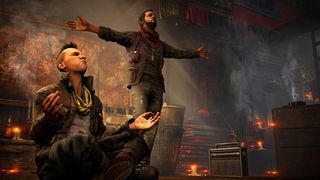
Sadly, the PvP multiplayer doesn’t exhibit the same sense of organised chaos as solo and co-op, meaning it’s likely to sink without trace. That’s despite a flurry of neat touches, such as wingsuits for all participants, radio masts that can be disabled to wipe out the enemy’s radar coverage, and a new playable faction, the Rakshasa, who get summonable bears and eagles in place of heavy weaponry. Not quite Call of Duty classique, then, but the modes boil down to ‘capture this, blow up that’, and the running and gunning itself doesn’t stick in the memory (those squeal-worthy, ‘DIY’ healing animations aside). Still, perhaps fans will rectify this once the generously featured map editor is updated to support PvP - it contains the lion’s share of all the soldiers, animals, buildings and vehicles from the campaign.
Dodgy though the plot may be, Ajay’s struggle to make sense of his inheritance suits a game that’s battling for a place in a world handed down to it by Far Cry 3 and other open-world action franchises. The result is hard to score because, that whiff of over-familiarity aside, the failings are easy enough to side-step - all you need do is head off the Golden Path. But the best open-worlders are those that balance their emergent odds and ends against a strong narrative thrust. Without a story as breathtaking as those forested vales and icy crags, Far Cry 4 rings a little hollow, and doesn't fully achieve the spiritual heights this series is capable of.
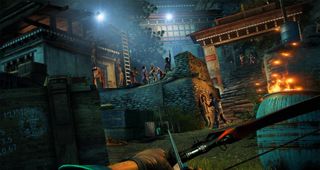
This game was reviewed on PS4 at a review event.
More info
| Genre | Shooter |
| Description | Taking a sharp turn away from the lush island jungles of the top-rated Far Cry 3, Far Cry 4 is set in Kyrat, an untamed region currently ruled by a despotic self-appointed king. But dont be lulled into a false sense of security by the achingly beautiful views; Kyrat is a wild land full of perils. |
| Franchise name | Far Cry |
| UK franchise name | Far Cry |
| Platform | "PS4","PS3","Xbox One","Xbox 360","PC" |
| US censor rating | "Mature","Mature","Mature","Mature","Mature" |
| UK censor rating | "","","","","" |
| Release date | 1 January 1970 (US), 1 January 1970 (UK) |

Metaphor: ReFantazio wanted to fix the JRPG grinding problem, but Atlus went too far at one point and accidentally broke the whole combat system
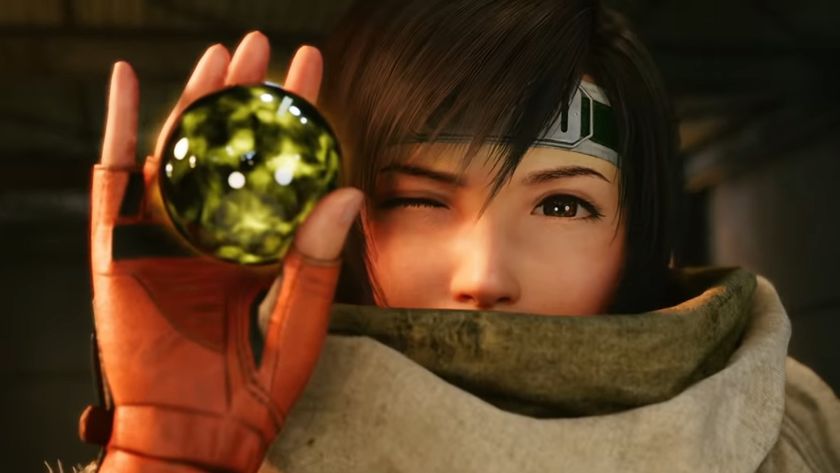
Final Fantasy 7 Remake and Rebirth battle director says combining everything he learned on Monster Hunter: World with Square Enix's technology and unique skills created a "chemical reaction"
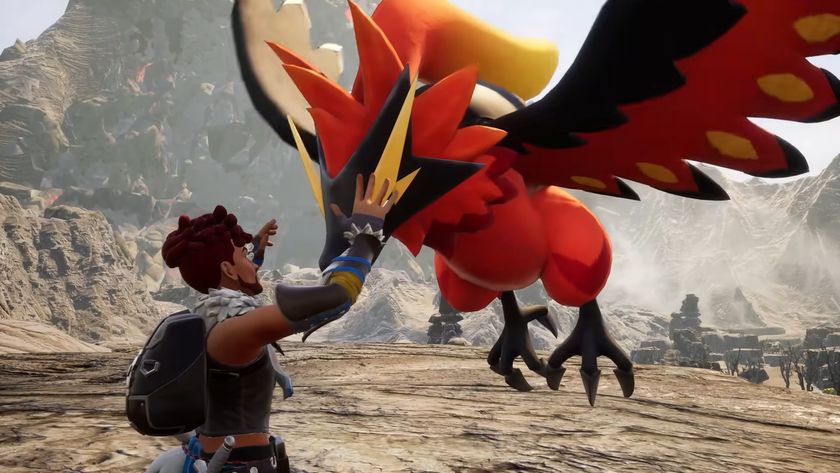
"Minutes after Palworld released," Pocketpair was already getting game pitches from "some really big names" before it even set up its own publisher: "No one has money at the moment"
